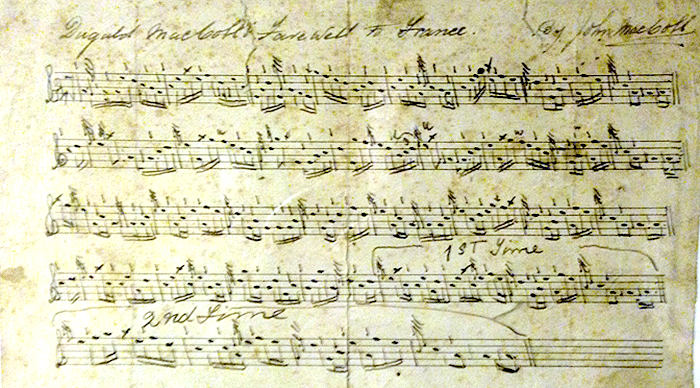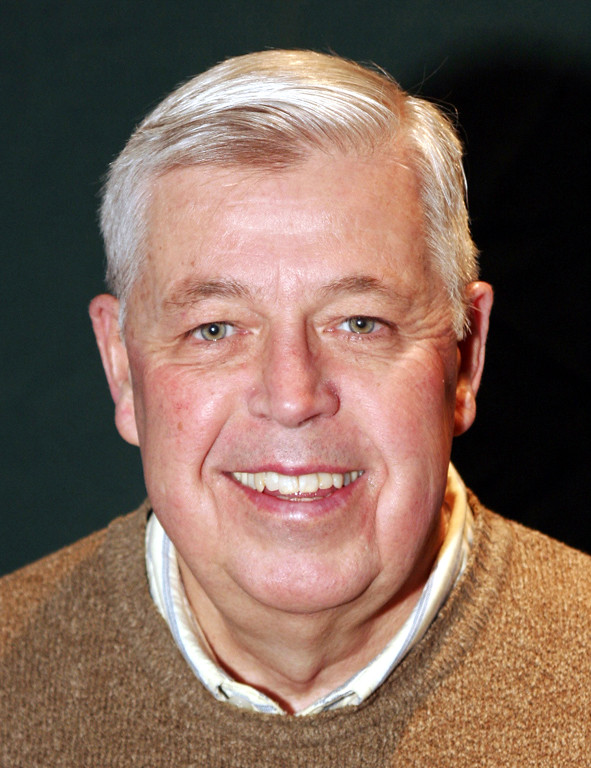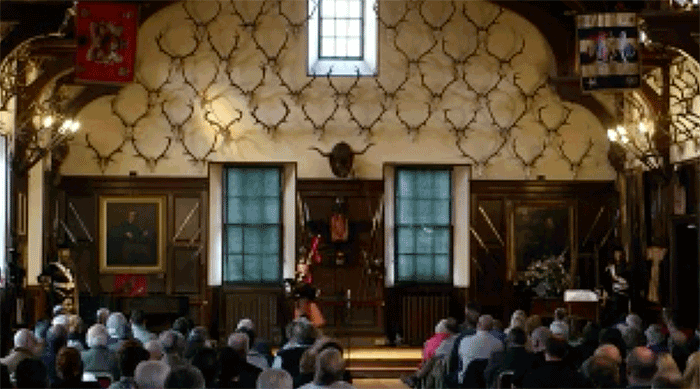
I suspect that what I write will attract comments from others who do not share my opinion. I hope we can have an interesting dialogue.
GS McLennan, John MacColl, Willie Lawrie, Roddy Campbell, where have you gone? We miss your music, your composing genius. (That’s MacColl’s masterpiece, Dugald MacColl’s Farewell to France, in the composer’s hand above.)

By Dale Brown
Today’s new music seems concentrated on hornpipes and jigs. Admittedly, they often have a flair that is a pleasure to listen to and play.
In many cases they are of quite a different style from those of a passed era. Fine, but what we are missing today are new marches, 2/4s and 6/8s, strathspeys and reels.
The repertoires of these idioms have become stagnant. The MSR music at Oban, Inverness and Glenfiddich is close to, if not completely, predictable.
And it’s not much different for Grade One bands who use almost exclusively use the same few six-parted tunes in their MSRs.

With the exceptions of P/M Donald MacLeod and Captain John A. MacLellan, when have you seen a piper in the top echelon do any serious composing in the last fifty years or longer?
I have heard that when Robert Reid was asked why he didn’t compose he replied (I paraphrase), ‘there is already enough music’.
The Bobs of Balmoral? Maybe two tunes between them. John MacFadyen? I see a few arrangements, but no compositions.
Seumas MacNeill? I have seen one 6/8 march. Donald MacPherson? A few good tunes but, all things considered, not that much. Today’s top luminaries? I have seen very little.
What conclusion can be drawn? It would appear great players seldom have possessed in equal measure a superb creative composing skill set – the legends mentioned at the head of this article excepted.
In the time afforded during this covid period, has very good (possibly even great) existing music that has lain dormant and unplayed in some cases for over 100 years been examined and tried?
It would be a shame when events open up again that we have to describe the tunes being played as ‘same old, same old’.
- US piper Dale Brown, Troy, Michigan, is the compiler of ‘complete collection’ music books by John McLellan DCM and John MacColl. He started piping aged 12 taught by Walter Rose, former Seaforth Highlander and student of Archie MacNeill the blind piper. Dale is a former USAF officer who served during the Vietnam War. Now retired from commercial banking, he is active in teaching piping and judging in the Midwestern US. If you would like to reply to his article please do so in our Comments section.
















I believe Bruce Gandy both composes and competes with his compositions. It was noted recently he won a prestigious Piob competition with a recent piob. composition of his. I’ve also heard him toss in his work into his light music selections. That, is however, a rarity. The Dr. Dan Reid Memorial, through their prescribed tune list, tried to address this issue by having years where the most heard “classics” weren’t highlighted and new compositions were put forward. This included the requirement of “20th Century” Piobs. These events were well received by the audience. I certainly concur that there needs to be an emphasis on new music for the top MSRs and bands need to be rewarded for playing something different. Whether it is “playing it safe, ” “playing to the judges,” or just doing what is easy, maybe a top band competition should have a prescribed tune list to get out of the ruts.
Dale – it is an interesting point that you raise, but not the conclusion I would have drawn. I don’t see any difference in your theory about pipe music than with any other genre of music.
For example, in the 18th and 19th century, profiles composers such as Mozart and Strauss wrote the popular music of the day. Popular taste has now moved on to Ed Sheeran and Adele, who could no sooner write a symphony than a piper of today make a piobaireachd worthy of Macrimmon.
But orchestras still strive to play classical music as well and musically as possible despite it being 200 years old. And so solo pipers do the same to their traditional forms. It’s important that both are maintained, and that composing style even if you try to compete with MacLeod or McLennan, moves on.
The interesting question is not “why do composers not write new music”, for as many others have pointed out, they do, and there is much new march, strathspey and reel music which would be eminently suitable for the contest platform. It’s also worth point out that of the pre-eminent composers of the past, most only contributed a few top-class tunes of each type to the canon over a lifetime.
The interesting question is why the light music competition has gone from the pre-war condition of being a hugely innovative platform for new composition and arrangement to the current highly conservative arena in which competitors appear to strive to sound as like one another as they can. Until the Second World War, competitors routinely made a healthy living entirely through winning prize money, and one would have thought with so much at stake that ‘playing it safe’ would have been the order of the day, but not a bit of it. Every player had their own arrangements of tunes and indeed presented new compositions with some regularity.
So if the incentives are not to blame, what is? I think the answer has to be judges. Until judges make a point of rewarding ambitious and interesting performances, competitors will be forced to play it safe. One could make the point that this was a situation predicted in the 1960s and 70s when judges started to be routinely drawn from the ranks of retired competitors, that such judges would reward technical excellence at the expense of artistic merit. That may or may not be fair, but it certainly describes the current state of piping competition.
Dale has a point, here. I have a bunch of CDs of World Championship Band Competitions. The same tunes are played over and over. But why? There must be a reason. For one thing, grade one and two bands seem to play almost exclusively 6 part tunes, at least for marches and reels. I guess they pipe majors must think that quantity trumps quality. In Ontario, at least, only grade one, two and three play sets of MSRs, and grade one and two tunes are dominated by six part tunes, There are many great tunes which are rarely played. If these bands would consider musicality instead of just playing six part tunes, maybe we would see and hear more variety. More new compositions is not the only answer to the monotony of “same old…same old.” Perhaps this monotony is compelled by judges who may exclude bands who play 4 part tunes from the prize list?
Same Old, Same Old
The comments to this posting have not really been that charitable (or constructive).
Let’s let the top players decide.
Sure there have been a lot of new tunes in the last 50 years…
But until the top solo players and the top Pipe Majors deem these tunes worthy…and play these tunes in competition…what good is the new tune…they will not become a classic…they will just be a tune…
The top players and Pipe Majors play the old classics…that’s how they win…talk to the judges here…
What we will hear are pretty much the same tunes for MSR…’Same Old, Same Old’…
Regarding Dale Brown…he may have one foot in the past…but he has always had one foot in the future…
Dale Brown has forgotten more about piping than any of us pretend to know…
“But until the top solo players and top Pipe Majors deem these tunes worthy…”
“The top players and Pipe Majors play the old classics…that’s how they win…”
You’ve contradicted yourself here, and accidentally stumbled on the real issue, which has been discussed on this platform and elsewhere, and in beer tents worldwide, ad nauseam, for decades. Many top solo players and Pipe Majors have been quite public about how they wish they could submit more modern tunes and give them an airing, and the reasons why they don’t.
I admire Dale Brown for raising this topic for discussion.
Initial thoughts:
Quantity does not always coincide with quality.
With faster paced interactions due to high speed transportation modes and internet communication, perhaps it is not surprising many newer compositions reflect a faster and, in my opinion, a somewhat less melodic flow that was characteristic of the older classics .
When students learn currently, very few write out their new tunes by hand. Without copy machines in the past, students copied out their tunes. This presented many with the opportunity to study the construction of the tune. If they noticed a repeating phrase or endings that were similar, they could just be economical and write in ditto marks. They might have noticed that tunes were built up by phrases, many of which were repeated. How many original bars are there in a 4 part 2/4 march? With this insight, those with time on their hands and an inclination to play around with the elements of the music they were studying, might discover a novel phrase landing in their mind. Having had the experience of writing out their own learning assignments, they would have the skill ready to jot down the new phrase, before it disappeared from their mind.
From what I have read, many of these great tunes were composed when people had periods of quiet and receptivity. Also, some were inspired by something meaningful or beautiful to them.
One can somewhat sense tunes that have been composed by means of a recipe or formula. These tunes, in my opinion, are not that interesting nor flowing.
Thus, I still admire and enjoy the great classic compositions. They are fun and interesting to learn.
An interesting book that is irrelevant to this topic: “Creative Authenticity:16 Principles to Clarify and Deepen Your Artistic Vision” by Ian Roberts.
Principle 15: “Finding poetry in the everyday”.
John Wilson’s widow, Margaret Wilson, gave me a copy of the words of the Slow March John composed when he was riding the bus from Hamilton to Toronto to visit her before they married. Hamilton Bay, p.3, Book 2 is a beautiful tune and seldom played. It became more meaningful when I saw how poetic (and romantic!) John was.
Is pipe music more than perfect tone and technique?
To compose great music requires receptivity, sensitivity, and inspiration.
I hope this topic raised by Dale Brown encourages us to consider the construction of the music we play, the required environment and skills that are conducive to our own composing explorations and the courageous freedom to just play with phrases that may show up, without the need to publish.
Betty Ann has some very valid points. I agree with her opinion, “many newer compositions reflect a faster and, in my opinion, a somewhat less melodic flow that was characteristic of the older classics .” My band, the Scottish Society of Windsor had a very good run over 40 years ago, winning 10 out of 11 firsts (and one second) in 1975. But after an absence of almost 40 years, someone brought over a CD of a pipe band. When I heard the first track, my comment was, “What the hell was that?” The first track was (IMHO) way too fast, and not melodic…. no swing to it! I was informed that it was a hornpipe, but it was played way too fast, and all the notes were even. There was no “swing” to the tune. I eventually got used to the so-called “Hornreels”, but musically, very few of them excited me. For a very limited time, because Covid prevented me from crossing the border, I was playing with an upper grade band. We were assigned the task of learning a set of three “hornpipes.” The first one was a hornpipe played by the Clan MacFarlane in the 1980s… it was a great tune….a tune with a fine melodic line and swing, but the other two, more modern compositions, lacked the kind of melody you could walk away whistling to yourself….. more like finger exercises. I suspect, some of the more modern competition marches and reels may be of the same ilk. And limiting your choices to only 6-parted tunes means that you can only play tunes that have stood the test of time, or play more modern tunes which, traditionally and melodically leave something to be desired! But maybe that’s just a old man talking!
Whew! This misses your own collection of John MacLellan, Dunoon, a prolific composer of good tunes, and both Peter MacLeods, Michael Grey, Bob Worrall… the list goes on, even if some are not as prolific (yet)
Yes, emphasis on hornpipes (the bulk of which are very forgettable) and jigs, but there are many good 2/4s, 6/8s etc. that have been composed. All they require is a top player to win a major event with them, or a top band to play them, and they become the flavour of the month or year. Think of the huge popularity of John MacColl’s March to Kilbowie Cottage when John Burgess kept winning with it – not as often heard today.
John MacDonald of Inverness is supposed to have said something similar about Piobaireachd – that the good tunes had all been composed already. But there are some great tunes that have been composed in modern times. In 50 years’ time
people will be playing tunes like Ceol na Mara (John MacKenzie) l Lament for Alan, My Son (Duncan Johnstone), The Edinburgh Piobaireachd (John A MacLellan) and rating them as being as good as most of the current “classics”
I am afraid I must dissent. In the last 40-50 years there has been a ton of new material, really good material, written by the likes of Bruce Gandy, Ann Gray, Chris Armstrong, Neil Dickie, Lincoln Hilton, etc etc etc and this is just off the top of my head. I am not even what I would call a cutting edge piper and I know these things. I think you may need to work on expanding your repertoire.
Wow. I don’t even know where to start with this. This sounds like it’s been written by someone living in a cave for the last thirty to forty years. It’s not a matter of “disagreement,” there is so much here that is just flat wrong. “When have you seen a piper in the top echelon do any serious composing in the last fifty years or longer?” Mr. Brown needs to get out more. And I don’t feel the need to bore anyone with an easy refutation of this statement. Firstly, great tunes don’t need to come from great players or those at the top of competitive success. Secondly, the last twenty years alone have seen an explosion of original and excellent bagpipe music including a great many 2/4s and 6/8s of the kind that Mr. Brown is missing. Again, there is no need to start listing the obvious. If Mr. Brown is searching for new “classics,” he doesn’t need to look far.